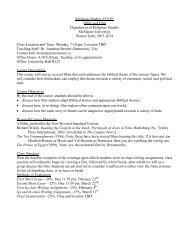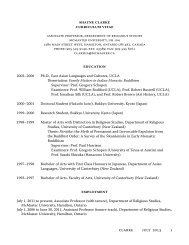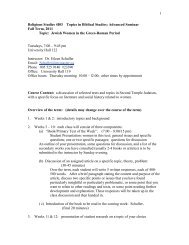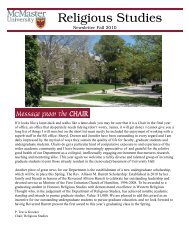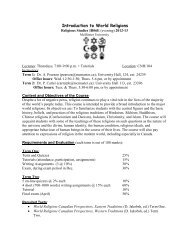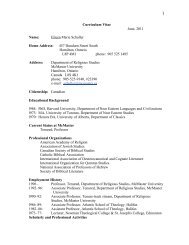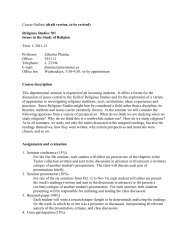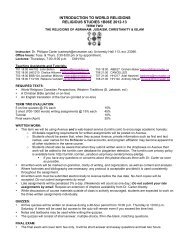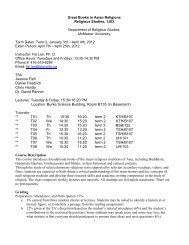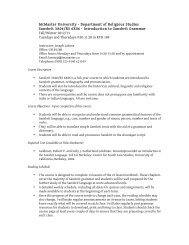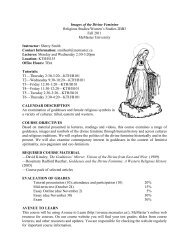Course Outline (PDF) - Department of Religious Studies
Course Outline (PDF) - Department of Religious Studies
Course Outline (PDF) - Department of Religious Studies
Create successful ePaper yourself
Turn your PDF publications into a flip-book with our unique Google optimized e-Paper software.
RS 701 Issues in the Study <strong>of</strong> Religion Office: UH 114. Tel: ext. 233 88.<br />
Fall 2012<br />
E-mail: runess@mcmaster.ca.<br />
Dr. Anders Runesson Office Hours: Friday 14.00-15.00<br />
<strong>Course</strong> Description<br />
This departmental seminar is required <strong>of</strong> all incoming students. It <strong>of</strong>fers a forum for the discussion <strong>of</strong> issues<br />
central to the field <strong>of</strong> <strong>Religious</strong> <strong>Studies</strong> and for the exploration <strong>of</strong> a variety <strong>of</strong> approaches to investigating<br />
religious traditions, texts, institutions, ideas, experiences and practices. Since <strong>Religious</strong> <strong>Studies</strong> might best be<br />
considered a field rather than a discipline, its theories, methods and issues can be extremely diverse. In the<br />
seminar we will consider the following questions from a variety <strong>of</strong> perspectives: What do we think we are<br />
studying when we study religions? Why do we think this is a worthwhile endeavour? How do we study<br />
religions? As in all seminars, we analyse not only the topics discussed in the assigned readings, but also the<br />
readings themselves, how they were written and why certain perspectives and materials may have been chosen.<br />
Requirements and Evaluation<br />
Seminar participation, weekly responses, intellectual biography (20%)<br />
You should complete all the assigned readings for each meeting <strong>of</strong> the seminar and be prepared to discuss them<br />
intelligently. Each week, you should write a brief response to the readings (not more than one page, times 12,<br />
single-spaced) and send it by email in pdf format to the other seminar participants, including me. Please send it<br />
by 5pm <strong>of</strong> the Monday before class. You will not receive an individual grade or comments on these responses,<br />
but they are part <strong>of</strong> participation in the seminar. They will help you to organise your thoughts before we meet.<br />
Before the first (non-organisational) meeting <strong>of</strong> the seminar, please compose a short intellectual biography (not<br />
more than one page, times 12, single-spaced). Describe what led you to begin your studies at McMaster. What<br />
is your area <strong>of</strong> interest? How do you see yourself fitting in to the larger field <strong>of</strong> <strong>Religious</strong> <strong>Studies</strong>? What is the<br />
significance to that field <strong>of</strong> what you study and how you study it? How might you explain your interests to<br />
someone outside the field?<br />
Participation in 701 mini-conferences (25%)<br />
An important part <strong>of</strong> the seminar consists <strong>of</strong> a series <strong>of</strong> mini-conferences/workshops/roundtables on issues in<br />
the study <strong>of</strong> religions. You will be asked to give short papers or presentations, respond to other presentations or<br />
be involved in a roundtable. Details <strong>of</strong> these mini-conferences and <strong>of</strong> your role in them will be distributed<br />
separately. You’ll be graded on your level <strong>of</strong> preparation, your ability to respond to the ideas <strong>of</strong> other<br />
participants, and the depth and breadth <strong>of</strong> your knowledge.<br />
Oral Presentation (25%)<br />
Students will each be assigned a recent issue <strong>of</strong> the Journal <strong>of</strong> the American Academy <strong>of</strong> Religion on which to<br />
present. You will have about 10-15 minutes during which you should briefly characterise the contents <strong>of</strong> the<br />
issue (not just articles, but also letters to the editor, book reviews etc.). Then go on to talk about what this<br />
particular issue <strong>of</strong> the JAAR can tell us about the state <strong>of</strong> our field, its dominant theories, methods, issues and<br />
problems. We’ll have one or two <strong>of</strong> these presentations each week, except during mini-conference weeks.<br />
Final project (30%)<br />
There is no research paper for this course. Instead you will submit a project composed <strong>of</strong> the following three<br />
elements: [1] a syllabus for an introductory undergraduate course on Issues in the Study <strong>of</strong> Religion, [2] a<br />
proposal for a one-day workshop on a particular issue or theme in <strong>Religious</strong> <strong>Studies</strong>. You should explain why<br />
the topic you have chosen deserves such a workshop, and include a list <strong>of</strong> scholars you want to invite (living or<br />
dead) and what they will talk about. [3] a minor paper (max. 5 pp.) where you apply insights gained during the<br />
term to your own field: where lie, according to your understanding, the major problems, opportunities, or<br />
methodological challenges in your field? In which way have assigned readings and discussions influenced your<br />
thinking regarding your present and future contributions to the field? Deadline: Monday December 10 at 5pm.<br />
1
Schedule<br />
SEMINAR DATE THEME READINGS<br />
1 Sept 11 Organisational meeting<br />
2 Sept 18 What is “Religion”? Can we Study<br />
it? Should we?<br />
3 Sept 25 Mini-conference 1<br />
The study <strong>of</strong> Religion in the<br />
Current Historical Moment<br />
4 Oct 2 <strong>Religious</strong> <strong>Studies</strong> as an Academic<br />
Discipline<br />
5 Oct 9 Thinking Through and Around<br />
“Religion”<br />
6 Oct 16 Mini-conference 2<br />
<strong>Religious</strong> Conflict and the View <strong>of</strong><br />
the ‘Other’: The case <strong>of</strong> Anti-<br />
Judaism and Anti-Semitism<br />
7 Oct 23 Rationality, Modernity, and Other<br />
Problems<br />
8 Oct 30 Mini-conference 3<br />
Sociology and Social-Scientific<br />
analysis <strong>of</strong> Religion: On Theories<br />
and Models<br />
9 Nov 6 Religion: The Material and the<br />
Physical<br />
10 Nov 13 Mini-conference 4<br />
Feminism and <strong>Religious</strong> <strong>Studies</strong>:<br />
Theory, Method, Application<br />
Smith, “Religion, Religions, <strong>Religious</strong>”;<br />
Lopez, “Belief”; Bell, “Performance”;<br />
McCutcheon, “The Category ‘Religion’ in<br />
Recent Publications”; Ward, “The Future <strong>of</strong><br />
Religion”; Engler, “’Religion,’ ‘the Secular’<br />
and the Critical Study <strong>of</strong> Religion.”<br />
Lincoln, Holy Terrors.<br />
Gill, “The Academic Study <strong>of</strong> Religion”;<br />
Smith, “Religion and <strong>Religious</strong> <strong>Studies</strong>”;<br />
Gerhart, “Dialogical Fields in <strong>Religious</strong><br />
<strong>Studies</strong>”; Wiebe, “Why the Academic Study<br />
<strong>of</strong> Religion?”<br />
Lincoln, “Conflict”; Masuzawa, “Culture”;<br />
Sharf, “Experience”; Schopen, “Relic”;<br />
Schopen, “Archaeology and Protestant<br />
Presuppositions.”<br />
Fonrobert; “Christian Anti-Judaism”;<br />
Cohen, Medieval Anti-Judaism, 19-50;<br />
Laqueur, Changing Face <strong>of</strong> Anti-Semitism, 71-<br />
89; Heschel, “Supersessionism”; Bristow<br />
(ed.) No Religion is an Island, 153-179.<br />
Stoller, “Rationality”; Benavides,<br />
“Modernity”; Winquist, “Person”;<br />
Hultkrantz, Ecology <strong>of</strong> Religion, 221–236.<br />
Hamilton, Sociology <strong>of</strong> Religion, 229-271;<br />
McGuire, Social Context, 155-187; Duling,<br />
“Recruitment to the Jesus Movement.”<br />
LaFleur, “Body”; Miles, “Image”; Wilson,<br />
“The Female Body as a Source <strong>of</strong> Horror<br />
and Insight”; Camporesi, Food and Fantasy in<br />
Early Modern Europe, 40-55.<br />
Juschka, “General Introduction”; Warne,<br />
“(En)gendering <strong>Religious</strong> <strong>Studies</strong>”;<br />
Shukrallah, “Islamic Movement”; Christ,<br />
“Feminist Paradigm Shift”; Schüssler<br />
Fiorenza, “Remembering the Past”; Shepard<br />
Kraemer, “Jewish Women”<br />
11 Nov 20 What is “Comparative Religion”? Slingerland, “Conceptual Metaphor<br />
Theory”; “Symposium on Donald S. Lopez<br />
Jr.’s Prisoners <strong>of</strong> Shangri-La” 163-214<br />
(Germano, Shakya, Thurman, Lopez Jr.)<br />
12 Nov 27 Mini-conference 5<br />
Postcolonialism and the Study <strong>of</strong><br />
Religion: Theoretical Foundations<br />
and Application<br />
Loomba, Colonialism/Postcolonialism, 1-20;<br />
Runesson, Exegesis in the Making, 1-16, 51-<br />
88; Sugirtharaja, Imagining Hinduism, 1-37,<br />
74-89.<br />
2
Bibliography (Required Readings)<br />
Bell, Catherine. “Performance.” Pages 205–24 in Critical Terms for <strong>Religious</strong> <strong>Studies</strong>. Edited by Mark C.<br />
Taylor. Chicago: University <strong>of</strong> Chicago Press, 1998.<br />
Benavides Gustavo. “Modernity.” Pages 186-204 in Critical Terms for <strong>Religious</strong> <strong>Studies</strong>. Edited by Mark<br />
C. Taylor. Chicago: University <strong>of</strong> Chicago Press, 1998.<br />
Bristow, Edward, ed. No Religion is an Island: The Nostra Aetate Dialogues. New York: Fordham<br />
University Press, 1998.<br />
Camporesi, Piero. Bread <strong>of</strong> Dreams: Food and Fantasy in Early Modern Europe. Chicago: University <strong>of</strong><br />
Chicago Press, 1989.<br />
Christ, Carol P. “Mircea Eliade and the Feminist Paradigm Shift.” Pages 571-590 in Feminism in the<br />
Study <strong>of</strong> Religion: A Reader. Edited by Darlene M. Juschka. London: Continuum, 2001.<br />
Cohen, Jeremy. The Friars and the Jews: The Evolution <strong>of</strong> Medieval Anti-Judaism. Ithaca: Cornell University<br />
Press, 1982.<br />
Duling, Dennis C. “Recruitment to the Jesus Movement in Social Scientific Perspective.” Pages 132-<br />
75 in Social Scientific Models for Interpreting the Bible. Edited by John J. Pilch. Leiden: Brill, 2001.<br />
Engler, Steven. “’Religion,’ ‘the Secular’ and the Critical Study <strong>of</strong> Religion.” <strong>Studies</strong> in Religion 40<br />
(2011) 419-442.<br />
Fonrobert, Charlotte Elisheva. “Jewish Christians, Judaisers, and Christian Anti-Judaism.” Pages<br />
234-254 in A People’s History <strong>of</strong> Christianity, vol. 2: Late Ancient Christianity. Edited by Virginia<br />
Burrus. Minneapolis: Fortress, 2005.<br />
Gerhart, Mary. “Dialogical Fields in <strong>Religious</strong> <strong>Studies</strong>.” Journal <strong>of</strong> the American Academy <strong>of</strong> Religion 62<br />
(1994): 997–1001.<br />
Gill, Sam. “The Academic Study <strong>of</strong> Religion.” Journal <strong>of</strong> the American Academy <strong>of</strong> Religion 62 (1994): 965–<br />
75.<br />
Gyatso, Janet, ed. “Symposium on Donald S. Lopez Jr.’s Prisoners <strong>of</strong> Shangri-La.” Journal <strong>of</strong> the<br />
American Academy <strong>of</strong> Religion 69 (2001): 163-214.<br />
Hamilton, Malcolm. The Sociology <strong>of</strong> Religion. 2d ed. London: Routledge, 2001.<br />
Heschel, Susannah. “From Jesus to Shylock: Christian Supersessionism and ‘The Merchant <strong>of</strong><br />
Venice’.” Harvard Theological Review 99, no. 4 (2006): 407-31.<br />
Hultkrantz, Åke. “Ecology <strong>of</strong> Religion: Its Scope and Methodology.” Pages 221-36 in Science <strong>of</strong> Religion.<br />
The Hague: Mouton, 1979.<br />
Juschka, Darlene M. “General Introduction.” Pages 1-22 in Feminism in the Study <strong>of</strong> Religion: A Reader.<br />
Edited by Darlene M. Juschka. London: Continuum, 2001.<br />
LaFleur, William. “Body.” Pages 36–54 in Critical Terms for <strong>Religious</strong> <strong>Studies</strong>. Edited by Mark C. Taylor.<br />
Chicago: University <strong>of</strong> Chicago Press, 1998.<br />
Laqueur, Walter. The Changing Face <strong>of</strong> Antisemitism: From Ancient Times to the Present Day. Oxford: Oxford<br />
University Press, 2006.<br />
Lincoln, Bruce. “Conflict.” Pages 55–69 in Critical Terms for <strong>Religious</strong> <strong>Studies</strong>. Edited by Mark C. Taylor.<br />
Chicago: University <strong>of</strong> Chicago Press, 1998.<br />
Lincoln, Bruce. Holy Terrors: Thinking about Religion After September 11. 2d ed. Chicago: University <strong>of</strong><br />
Chicago Press, 2003.<br />
Loomba, Ania. Colonialism/Postcolonialism. London: Routledge, 1998.<br />
Lopez, Donald. “Belief.” Pages 21–35 in Critical Terms for <strong>Religious</strong> <strong>Studies</strong>. Edited by Mark C. Taylor.<br />
Chicago: University <strong>of</strong> Chicago Press, 1998.<br />
Masuzawa, Tomoko. “Culture.” Pages 70–93 in Critical Terms for <strong>Religious</strong> <strong>Studies</strong>. Edited by Mark C.<br />
Taylor. Chicago: University <strong>of</strong> Chicago Press, 1998.<br />
McCutcheon, Russell T. “The Category ‘Religion’ in Recent Publications: A Critical Survey.” Numen<br />
42 (1995): 284-309.<br />
McGuire, Meredith B. Religion: The Social Context. 2d ed. Belmont: Wadsworth, 1987.<br />
Miles, Margaret R. “Image.” Pages 160–172 in Critical Terms for <strong>Religious</strong> <strong>Studies</strong>. Edited by Mark C.<br />
Taylor. Chicago: University <strong>of</strong> Chicago Press, 1998.<br />
3
Runesson, Anna, Exegesis in the Making: Postcolonialism and New Testament <strong>Studies</strong>. Leiden: Brill, 2011.<br />
Schopen, Gregory. “Archaeology and Protestant Presuppositions in the Study <strong>of</strong> Indian Buddhism.”<br />
History <strong>of</strong> Religions 31, no. 1 (August 1991): 1–23.<br />
__________. “Relic.” Pages 256–268 in Critical Terms for <strong>Religious</strong> <strong>Studies</strong>. Edited by Mark C. Taylor.<br />
Chicago: University <strong>of</strong> Chicago Press, 1998.<br />
Schüssler Fiorenza, Elisabeth. “Remembering the Past in Creating the Future: Historical-Critical<br />
Scholarship and Feminist Biblical Interpretation.” Pages 43-63 in Feminist Perspectives on Biblical<br />
Scholarship. Edited by Adela Yarbro Collins. Chico: Scholars Press, 1985.<br />
Seneviratne, Thalatha and Jan Currie. “Religion and Feminism: A Consideration <strong>of</strong> Cultural<br />
Constraints on Sri Lankan Women.” Pages 198-220 in Feminism in the Study <strong>of</strong> Religion: A Reader.<br />
Edited by Darlene M. Juschka. London: Continuum, 2001.<br />
Sharf, Robert H. “Experience.” Pages 94–116 in Critical Terms for <strong>Religious</strong> <strong>Studies</strong>. Edited by Mark C.<br />
Taylor. Chicago: University <strong>of</strong> Chicago Press, 1998.<br />
Shepard Kraemer, Ross. “Non-Literary Evidence for Jewish Women in Rome and Egypt.” Pages 221-<br />
38 in Feminism in the Study <strong>of</strong> Religion: A Reader. Edited by Darlene M. Juschka. London:<br />
Continuum, 2001.<br />
Shukrallah, Hala. “The Impact <strong>of</strong> the Islamic Movement in Egypt.” Pages 180-97 in Feminism in the<br />
Study <strong>of</strong> Religion: A Reader. Edited by Darlene M. Juschka. London: Continuum, 2001.<br />
Slingerland, Edward. “Conceptual Metaphor Theory as Methodology for Comparative Religion.”<br />
Journal <strong>of</strong> the American Academy <strong>of</strong> Religion 72 (2004): 1-31.<br />
Smith, Jonathan Z. “Religion and <strong>Religious</strong> <strong>Studies</strong>: No Difference at All.” Soundings 71 (Summer/Fall<br />
1988): 231–244 [to be distributed].<br />
__________. “Religion, Religions, <strong>Religious</strong>.” Pages 269-84 in Critical Terms for <strong>Religious</strong> <strong>Studies</strong>. Edited<br />
by Mark C. Taylor. Chicago: University <strong>of</strong> Chicago Press, 1998.<br />
Stoller, Paul. “Rationality.” Pages 239–255 in Critical Terms for <strong>Religious</strong> <strong>Studies</strong>. Edited by Mark C.<br />
Taylor. Chicago: University <strong>of</strong> Chicago Press, 1998.<br />
Sugirtharaja, Sharada. Imagining Hinduism: A Postcolonial Perspective. London: Routledge, 2003.<br />
Taylor, Mark C., ed. Critical Terms for <strong>Religious</strong> <strong>Studies</strong>. Chicago: University <strong>of</strong> Chicago Press, 1998.<br />
Ward, Graham. “The Future <strong>of</strong> Religion.” Journal <strong>of</strong> the American Academy <strong>of</strong> Religion 74 (2006): 179-86.<br />
Warne, Randi R. “(En)gendering <strong>Religious</strong> <strong>Studies</strong>.” Pages 147-56 in Feminism in the Study <strong>of</strong> Religion: A<br />
Reader. Edited by Darlene M. Juschka. London: Continuum, 2001.<br />
Wiebe, Donald. “Why the Academic Study <strong>of</strong> Religion? Motive and Method in the Study <strong>of</strong> Religion.”<br />
<strong>Religious</strong> <strong>Studies</strong> 24 (1988): 403–413 [to be distributed].<br />
Wilson, Liz. “The Female Body as a Source <strong>of</strong> Horror and Insight in Post- Ashokan Indian Buddhism."<br />
Pages 76-99 in <strong>Religious</strong> Reflections on the Human Body. Edited by Jane Marie Law. Bloomington<br />
and Indianapolis: Indiana University Press, 1995 [to be distributed].<br />
Winquist, Charles E. “Person.” Pages 225–238 in Critical Terms for <strong>Religious</strong> <strong>Studies</strong>. Edited by Mark C.<br />
Taylor. Chicago: University <strong>of</strong> Chicago Press, 1998.<br />
Not included in the readings but recommended for the mini-conference on sociology and religion:<br />
Berger, Peter L. The Sacred Canopy: Elements <strong>of</strong> a Sociological Theory <strong>of</strong> Religion. Garden City: Doubleday,<br />
1967 [especially pp. 1-52].<br />
4



